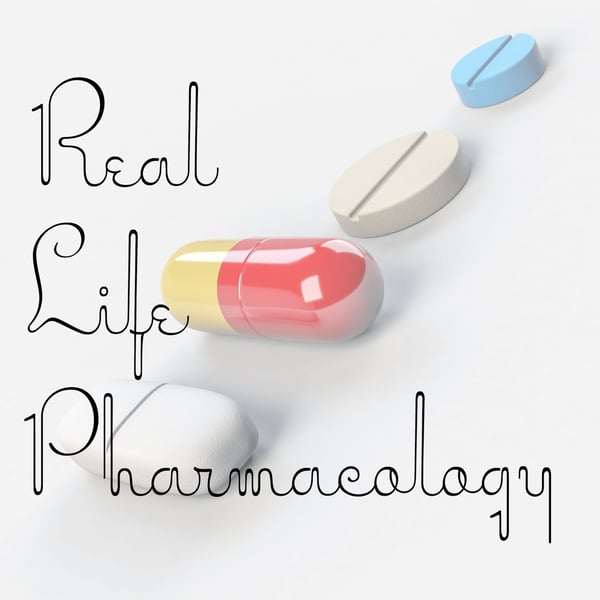Calcium Acetate Pharmacology
Real Life Pharmacology - Pharmacology Education for Health Care Professionals
Eric Christianson, PharmD; Pharmacology Expert and Clinical Pharmacist
5 • 716 Ratings
🗓️ 9 April 2020
⏱️ 12 minutes
🧾️ Download transcript
Summary
Important monitoring parameters for calcium acetate include phosphorus, calcium, PTH, and renal function.
There are numerous binding interactions with calcium acetate. It can reduce concentrations of some HIV drugs, antibiotics, and thyroid supplements. I discuss more examples in the podcast.
Thiazide diuretic in combination with calcium acetate may increase the risk for hypercalcemia.
Transcript
Click on a timestamp to play from that location
| 0:00.0 | Hey all, welcome back to the Real Life Pharmacology podcast. |
| 0:04.0 | Thanks so much for listening. |
| 0:05.6 | I am your host, Eric Christensen. |
| 0:08.4 | And if you'd like to reach out to me, definitely feel free to drop me an email at Metat101.com. |
| 0:15.4 | Hit the contact button. |
| 0:17.1 | If you like the podcast today, definitely leave us a rating review on iTunes. |
| 0:21.4 | Greatly appreciate it or share us with a friend colleague email list wherever you run into those pharmacology loving friends. |
| 0:31.9 | All right, with that, let's get into the drug of the day, and that is going to be calcium acetate. |
| 0:39.1 | Brand name of this medication is Foslo, and this drug is a phosphate binder. |
| 0:48.7 | And so when I think about this, okay, why would we need a phosphate binder? |
| 0:55.8 | Essentially, this drug, through its mechanism, binds up phosphorus in the gut |
| 1:01.7 | and prevents absorption of phosphorus into systemic circulation. |
| 1:09.0 | And this accumulation of phosphorus is generally a problem in patients with |
| 1:16.9 | chronic kidney disease. So if you remember, the kidney is the filter of the body. It helps |
| 1:24.1 | regulate electrolyte levels and phosphorus is certainly one of those things. |
| 1:30.8 | So in KD, we can get hyperphosphatemia, and from that we may need to reduce the risk from some of those complications of hyperphosphatemia by giving a phosphate binder. |
| 1:45.0 | Okay, very, very important to, I think, |
| 1:48.0 | remember that background and why we would potentially |
| 1:51.0 | need a phosphate binder. |
| 1:54.0 | Now, this binds phosphate in the gut. |
| 1:58.0 | What does that mean as far as administration? So very important to remember to administer this drug |
| 2:07.3 | with food or meals. Because we're binding phosphate in the gut. If we're not eating at the time that we're administering this drug, |
... |
Transcript will be available on the free plan in -1814 days. Upgrade to see the full transcript now.
Disclaimer: The podcast and artwork embedded on this page are from Eric Christianson, PharmD; Pharmacology Expert and Clinical Pharmacist, and are the property of its owner and not affiliated with or endorsed by Tapesearch.
Generated transcripts are the property of Eric Christianson, PharmD; Pharmacology Expert and Clinical Pharmacist and are distributed freely under the Fair Use doctrine. Transcripts generated by Tapesearch are not guaranteed to be accurate.
Copyright © Tapesearch 2025.

